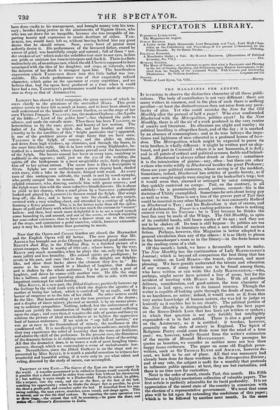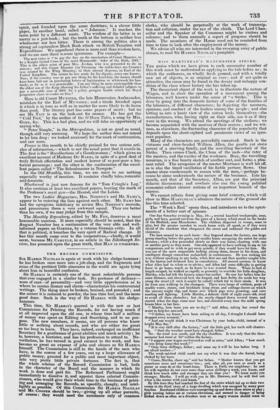THE MAGAZINES FOR AUGUST.
IT is curious to observe the distinctive character bf all these publi- cations. The body of contributors is not very different : there are many writers in common, and in the plan of each there is nothing peculiar—at least the distinctiveness does not arise from any peen- barity of plan. Yet who could .mistake the New for the Old Monthly after the perusal of half a pao-e? Who ever confounded Blackzeood with the Metropolitan, politics apart? In the New Monthly, there is all the air of a work produced in the very centre of society and literature. Its allusions are slight and touchy ; its political handling is altogether fresh, and of the day ; it is marked by an absence of commonplace; and in its tone betrays the impa- tience and lightness of Men educated in a profound horror of bore- dom. The Metropolitan, which might be expected to prove its twin brother, is wholly different : it might be written part on ship- board, and part in Cornwall : where it is not humorous, it is dull ; and in all points of critical and political acumen, feeble and behind- hand. Blackwood is always either drunk or drowsy : sometimes it is the intoxication of genius—nay, often : but there are other writers who write wildly in Blackwood besides the great Professor; these are your political roisterers, whose raving is of the maddest. Sometimes, indeed, Blackwood has articles of gentle beauty, as if some new-caught angels were singing in the bookseller's trap; but it would seem that, alarmed or outraged by noisy companions, they quickly contrived an escape. Tait, on the contrary, is all sobriety—he is preeminently sound, serious, earnest—his is the doctrine of Utility exemplified. Sometimes he sets about being gay as well as wise. There is not a line of the graver part of Tait that could be inserted in any other Magazine : he is as eminently Radical as Blackwood is Tory ; and his Radicalism is that of reason, and. not of declamation. Fraser is: a trading politician-: there is nothing earnest even in his Toryism : he is Tory because he thinks the best fun may be made of the Whigs. The Old Monthly, in spite of its youthful hands, still bears marks of its age ; and they are not to be shaken off. Its tone is still bygone : its polities are too declamatory, and its literature too often a new edition of ancient fiction. Perhaps, however, this Magazine is better adapted to a general circulation than any of the others : it is as likely to please in the housekeeper's room as in the library—in the farm-house as in the reading-room of a club. Of this month's batch, we have a favourable report to make. The New Monthly has the continuation of Lady BLESSINGTON'S Journal; which is beyond all comparison the best thing that has been written on Lord ByttoN—the truest, cleverest, and most pleasing. We have greatly underrated the talents and education of our women, if many writers are to be found among them; who have written or can mite like Lady BLESSINGTON,—who, perhaps, might never have printed a line of prose, but for the accident of meeting with BYRON in Italy. With all possible delicacy, consideration, and good-nature, the true character of BYRON is laid open, even to its inmost recesses. Though the writer is capable of looking quite through the deeds of men, there is no harshness, no satire; - indeed, it would seem as if, from this very entire knowledge of human nature, she was led to judge as leniently as it enables her to see clearly. The political portion of the New Monthly is distinguished by perhaps the best paper on the Russo-Dutch Loan that has been yet written or spoken ; in which that question is not only, forcibly but intelligibly expounded—it is in fact settled. There is also a good paper on the Aristocracy, as it is entitled: it touches, however; generally on the state of society in England. The Spirit of Religious Poetry could come from none but the mind of a true poet: we, however, totally dissent from the -Writer's estimation of the merits of Messiah MONTGOMERY. The passages he quotes as beauties, we consider as neither more nor less than happy lasus verborum. The paper on some old English prose- writers, such as Sir THOMAS ELYOT and ASCHAM, however de- cent, we hold to be out of place. All that was necessary had. already been done for these worthies in the .Retrospective Review; and at any rate, the subject is unfit for a monthly that pretends to influence public opinion: at best, they are but curiosities, and there is no time now for curiosities.
Next in the order of merit, stands Tait, this month. • His Fifth Number is a highly meritorious collection of valuable papers. The first article is perfectly admirable for its lucid profundity. It is an appreciation of the moral state of the country in connexion with the election of a representative government. We trust that some -plan will be hit upon for extending the usefulness of this paper; -which is to be followed by another-next month. In the same Spirit, and founded upon the same doctrines, is a clever little paper, by another hand, called a " Johannic." It reaches the same point by a different route. The wisdom of the latter is as merry as a jest-book ; but the truth at the bottom is neither less wholesome nor less bitter. There is among the politics also a strong ad captandunz Black Book attack on British Taxation and Expenditure. We apprehend there is more zeal than wisdom here, and we are sure there is some ignorance. For example— The next entry is 66 to pay the fees on the nomination of Count Munster, to be a Knight Grand Cross of the most Honourable Order of the Bath, 3301." This is the eldest scion of poor Mrs. Jordan, who was permitted to die in misery; and this Count Munster (in "Germany the stable-boys are Counts) was created by the Whig Ministry, to their eternal disgrace, an Earl of the United Kingdom. The return he has made for his dignity, every one knows. Now, if the country was to pay any thing for his Lordship, the money should have been laid out in purchasing letters of legitimation to whitewash his bas- tardy, as far as it was practicable. Can any thing be more contemptible than the eldest son of the King allowing his father's suffering and deluded subjects to pay a miserable sum of 330/.. for a paltry gewgaw bauble which his Royal progenitor chose to confer on him ? Here is old Count MUNSTER, the late Hanoverian Ambassador, mistaken for the Earl of MUNSTER; and a 'tirade founded upon it which is in tone as well as in matter far more likely to do harm than good. The literary part has some papers of merit but we see Mr. TAIT is on the look-out for names. He has got the "Cold Feet," by the author of the O'Hara Tales, a song by Mrs. GORE, &c. This is a bad plan, and we will take an opportunity of saying why. " Peter Simple," in the Metropolitan, is not so good as usual, though still very amusing. We hope the author does not intend to let him drop : we looked anxiously for the mark of continuation, and saw none.
Fraser is this month to be chiefly praised for two serious arti- cles of information,—which is not the usual point that it excels in. The first is the "Recollections of a Gentlewoman ;" which gives an excellent account of Madame Du BARRI, in spite of a good deal of truly British affectation and modest horror of so paw-paw a his- torical personage : and the other is the continuation of the excel- lent papers called "The Schoolmaster in Newgate." In the Old Monthly, this time, we are sorry to see nothing especially worthy of mention. It contains chiefly tales, romantic and domestic.
• Blackwood is just now famous for its "Tom Cringle's Log." It also contains at least two excellent papers, bearing the mark of the Professor's royal paw—the Hesiod, and the Lakes.
The two Ladies' Magazines, Mrs. NORTON'S and Mr. SAMS'S, appear to be entering the lists against each other. Mr. SA.MS has had the egregious indelicacy to review Mrs. NORTON'S recruits, and pronounces them a very awkward squad. They are better than his own, if we may judge from this sample.
The Monthly Repository, edited by Mr. Fox, deserves a most honourable mention. It more especially should be noted, that the August Number has a continuation of the very able and well- informed papers on GOETHE, by a veteran German critic. In all that is political, it breathes the very spirit of Radical change. It has this month come over to the cooperatives,—chiefly, it would seem, because Mr. CARLYLE, in an article in the Edinburgh Re- view, has pounced upon the great truth, that MAN IS UNSERYED.




























 Previous page
Previous page